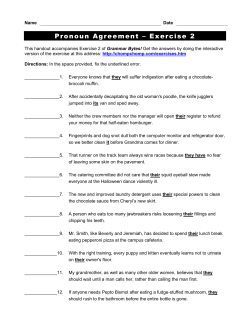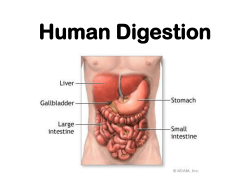
Flatulence Bloating, Gas &
Bloating, Gas & Flatulence Excessive Flatulence (passing wind) and Bloating (a full and gassy feeling in the gut) are very common digestive complaints in today’s society. In fact they are so common that they are often considered ‘normal’ in our everyday life. Upon questioning, a large number of clients of Gut Matters often ‘own up’ to having this embarrassing problem, not realising that these symptoms are signs of poor digestion, compromised absorption (leading to nutritional deficiencies) and gut dysfunction. With bloating and flatulence your digestive system is literally unable to digest the foods you are eating properly. If your bloating is an irregular occurrence with few other regular symptoms, then chances are there is nothing to worry about. But if your bloating occurs regularly, especially after eating, then this suggests a gastrointestinal tract (GIT) dysfunction. As symptoms of persistent bloating and flatulence often present in various colorectal pathology, you are advised to check first with your medical specialist to ensure there is no underlying condition. What are the causes of bloating and flatulence? Occasional bloating and flatulence can be caused by: • Air in the stomach, intestine or colon - twhis can occur from swallowing air, by eating too quickly and more often from stress. It also can be the effect of food/fluid retention in the intestines because the food you are eating is unable to be digested easily and gases are given off from gut bacteria. • Eating too large a meal would also have this effect, as it is a normal bodily function from being overfull. Chewing food carefully and thoroughly is important for the digestive juices to be able to break down food adequately. Although this may not create a problem initially, continued overeating and eating meals too quickly can set up a digestive dysfunction in the long term. But if your bloating occurs regularly and especially if after eating only a small meal, then this suggests a GIT (gastrointestinal tract) dysfunction. Copyright©Gutmatters2008 PAGE www.gutmatters.com Possible causes of chronic bloating can be: • Low stomach acid production (hypochlorydia). Stomach acid is necessary to digest our food and is Nature’s antibiotic. Hypochlorydia causes food fermentation to occur in the stomach and can also lead to Reflux (heartburn)* as the gases produced push stomach acid back into the oesophagus, forcing open the oesophageal sphincter and causing a burning pain. • Low production of enzymes in the stomach for digestion of food. We need enzymes such as protease for digestion of proteins, lipase for fats, and amylase for digestion of carbohydrates. If food is not broken down fully in the stomach by these enzymes (or there are poor food combinations), then this will result in indigestion. • Poor food combinations confuse the digestive system i.e. eating fruit with protein means that a number of different digestive responses are needed to digest this meal. See our article on Food combining*. • Bloating after eating sugary foods suggests an imbalance of gut micro flora termed Dysbiosis*. This may include an overgrowth of yeast known as Candida* (Candida albicans is a normal yeast resident in our GIT, but if it proliferates to excess it can have profound negative effects on our health). A document on Dysbiosis accompanies this information sheet. • Food intolerances/allergies* can also cause bloating and flatulence and the most common culprits are wheat, gluten and dairy products, sugars and fructose. Commonly, bloating is accompanied by flatulence.The likely causes of flatulence are similar to bloating but usually: • It occurs after eating large amounts of poorly absorbed carbohydrates such as wheat, milk, sugars and alcohol. Carbohydrate and fructose intolerance are very common. • Intolerance to certain foods and an Elimination & Challenge diet* would be the best way to find the culprits. • Gas may also be produced after eating high fat meals, due to production of carbon dioxide in the gut, released as gas. • Odorous gas can be caused by the metabolism of sulfur-containing proteins and amino acids (proteins) in the intestines. Chronic malodorous gas may be a sign of digestive difficulties. If accompanied by diarrhoea and weight loss, seek advice from your health care professional. Copyright©Gutmatters2008 PAGE www.gutmatters.com THE MEDICAL APPROACH Your doctor will probably not have very much to offer to alleviate your symptoms. The common approach is to suggest reduction of foods that commonly create bloating and flatulence i.e. poorly digested foods such as root vegetables, grapes, mustard, beans and lentils as well as the Brassica vegetables - brussels sprouts and cabbage. Also fibre supplements and a high fibre diet can create these problems and your doctor may suggest you avoid these. However you will be missing out on important foods groups in avoiding these foods. There are several over-the-counter medications to treat gas-related symptoms including Simethicone, Phazyme, Flatulex, Mylicon, Gas-X, Mylanta Gas, activated charcoal or peppermint oil. But these do not get to the underlying cause. THE NATURAL THERAPISTS APPROACH Treatment: Because the causes of bloating, gas and wind can be many, we advise you to first contact your medical specialist to ensure there is no underlying disease process causing your problem, especially if your condition occurs with altered bowel habits. Otherwise we outline below a step by step approach to help you address your problem based on our long experience in treating the causes of GIT dysfunction and knowing what works and what doesn’t. Here some simple tips to carry out first in order of importance: Step 1 • Eat 5 small meals per day instead of 3 larger meals. • To improve digestion – take 1 tablespoon of organic cider vinegar (must be unfiltered & unprocessed – not supermarket brand) in a little water 10 minutes before each meal. This will stimulate your stomach acid and enzyme production. Often this one step does the trick! • Make an effort to eat slowly – put down your knife and fork between bites. • Chew food, especially meat and proteins thoroughly and slowly. Avoid excess meat or protein in one meal – protein should be no more than the size of the palm of your hand. • Try not to eat starchy carbohydrates (i.e. rice, pasta) and sugars (in fruit) with proteins, as these are digested differently and confuse the digestion. Proteins should be eaten with vegetables only. Often, poor food combining is the culprit. See our Food Combining diet sheet*. Copyright©Gutmatters2008 PAGE www.gutmatters.com • Certainly eliminate all carbonated/fizzy drinks from your diet. • Avoid lying down soon after eating. • Don’t skip meals or eat late at night before bed or when under stress – your body is not adapted to digest food under these conditions or at these times. • Avoid high fat meals and avoid hydrogenated or processed fats. • When eating legumes, cabbages etc, try adding a little seaweed (dried) to your boiling water – this often prevents these foods from being ‘gassy’. • If after doing all of the above your complaint has still not improved – give Digestive Enzymes a go. Choose a good plant derived enzyme combination including: lipase, protease, amylase and if possible bromelains and papain (take care if intolerant or allergic to pineapple). Our online shop includes such an enzyme. Step 2 If symptoms persist after doing all of the above, now is the time to look at what you are eating. • Keeping a diet diary will go a long way to helping you find what causes your flatulence and/or bloating. • In order to find out what foods you are intolerant to, carry out a ‘mini’ elimination and challenge diet removing wheat, dairy, and all sugars and sugar substitutes (i.e. fructose, sucrose, anything with ‘ose’ at the end). See our Elimination and Challenge* diet sheet. This is the hardest part – but it really works! • If this still does not produce results then eliminate the other foods on this diet sheet. • If you discover you are lactose intolerant (found in milk and dairy products) – you may take the enzyme lactase before you consume these foods. However we do not recommend a high dairy diet. Note: lactose is found in very small amounts, if any, in yoghurt due to the use of lactose by live bacteria in this food. Similarly for some cheeses. Copyright©Gutmatters2008 PAGE www.gutmatters.com Step 3 Correct intestinal Dysbiosis*. See accompanying document. • This ideally should be done with a complete digestive detoxification programme – see our suggested Clean, Clear, Correct & Colonise programme* information sheet. This involves using herbal medicines to destroy any harmful bacteria and pathogens in the gut, improving bowel function, improving the integrity of the gut mucous lining (Leaky Gut*) and reinoculating with healthy bacteria. It is important to use a quality probiotic but only AFTER finishing the repair program above. • Regularly use a quality Probiotic including multiple strains of bacteria – take on an empty stomach. • The yeast Saccharomyces boulardii is very useful in supporting the establishment of friendly bacteria in the GIT and discourages growth of harmful microorganisms and can relieve any symptoms of Diarrhoea and Candida overgrowth. • Herbal medicines are very effective for relieving bloating and flatulence – and your naturopathic practitioner can make a formula for you. It may include: Bitter candy tuft, Chamomile, Melissa, Licorice, Peppermint, Gentian, Fennel and Aniseed. We hope this information sheet has given you enough ammunition to alleviate your Gut complaints. Please Check the Gut Matters web site for other information that will assist you or products that are available for this condition. However if you require any further assistance or a feel a consultation would be best to handle your particular situation – please contact Ros Andrews or Tammy Mitchum for a personal consultation service. *Treatment plans available from online store. *Information sheets available from online store Disclaimer: All information provided on Gutmatters is believed to be accurate and true and is provided for information purposes only. This information is not intended to treat, diagnose, cure or prevent any disease. Always seek the advice of your doctor with any questions you have regarding a medical condition, before undertaking any diet, health suggestion or other procedure set out on this Site. www.gutmatters.com Copyright©Gutmatters2008 PAGE www.gutmatters.com
© Copyright 2025
















